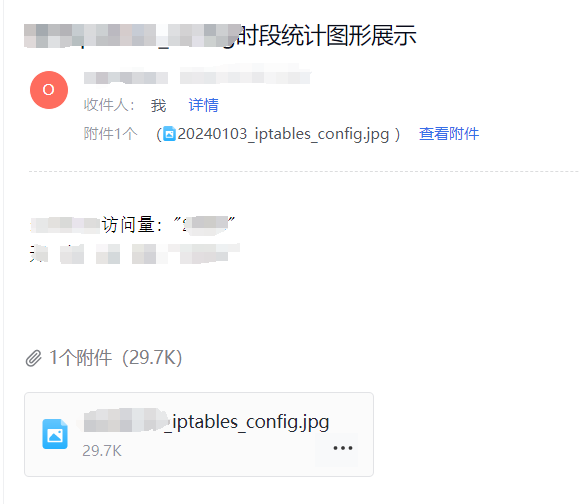从zabbix获取的监控数据和图形通过python脚本发送邮件
1.直接上python脚本(python版本为 2.7)
#coding:utf8
import smtplib
from email.mime.text import MIMEText
from email.mime.multipart import MIMEMultipart
from email.header import Header
import time
import os
#邮件内容可以执行脚本或者自定义信息内容(这里的脚本可以是从zabbix获取的监控数值)
#result = os.popen("/root/script/result_id.sh")
#read = result.read()
read = "asdadada"
localtime = time.strftime("%Y%m%d", time.localtime())
print "本地时间为 :", localtime
sender = 'xxxxxxxxx@163.com' #发送人邮箱
passwd = 'xxxxxxxxxxxxx' #发送人邮箱授权码
#receivers = ['xxxxxxxxxxxx1@163.com','xxxxxxxxxxxx2@163.com','xxxxxxxxxxxx3@163.com'] #收件人邮箱
receivers = ['test@qq.com'] #自己的邮箱
subject = 'xxxxxxxxx时段统计图形展示' #主题
#content = '这是我使用python smtplib模块和email模块自动发送的邮件' #正文
msg = MIMEMultipart()
msg['Subject'] = subject
msg['From'] = sender
msg['TO'] = ",".join(receivers)
msg['Subject'] = Header(subject, 'utf-8')
msg.attach(MIMEText(read,'plain','utf-8'))
#att1可以有多个,直接复制即可
att1 = MIMEText(open('/root/script/%s_iptables_config.png'%(localtime), 'rb').read(), 'base64', 'utf-8')
att1["Content-Type"] = 'application/octet-stream'
# 这里的filename可以任意写,写什么名字,邮件中显示什么名字
att1["Content-Disposition"] = 'attachment; filename=%s_iptables_config.jpg'%(localtime)
msg.attach(att1)
#我这里用的163邮箱,其他邮箱自行百度
try:
s = smtplib.SMTP_SSL('smtphz.qiye.163.com',465)
s.login(sender,passwd)
s.sendmail(sender,receivers,msg.as_string())
print('发送成功')
except Exception,e:
print e
2.验证邮件是否正确

3.参考地址:
https://blog.csdn.net/Xylon_/article/details/114539337
4. 其他测试
#!/bin/bash
#hosts id=10440,查看监控项id=37528的键值命令如下:
ZABBIX_REQUEST=$(curl --location --request GET 'http://10.10.128.133/api_jsonrpc.php' \
--header 'Content-Type: application/json' \
-d '{
"jsonrpc" : "2.0" ,
"method" : "item.get" ,
"params" :{
"output" : [ "itemids" , "key_" ],
"hostids" : "10440"
},
"auth": "fe77aad2988bdc54b1949c81cbd5a1f2",
"id":1
}')
ITEM_VALUE=$(echo $ZABBIX_REQUEST | jq '.result')
#echo $ITEM_VALUE
for result in "${ITEM_VALUE[@]}"
do
#echo "$result"
result1=$(echo "$result" | jq -r '.[] | select(.itemid == "37528")')
#echo "$result1" | jq '.itemid'
a=$(echo "$result1" | jq '.key_')
echo $a
[ ${a} == '"my.app.alive[mysqld]"' ]&& echo 1||echo 0
done



